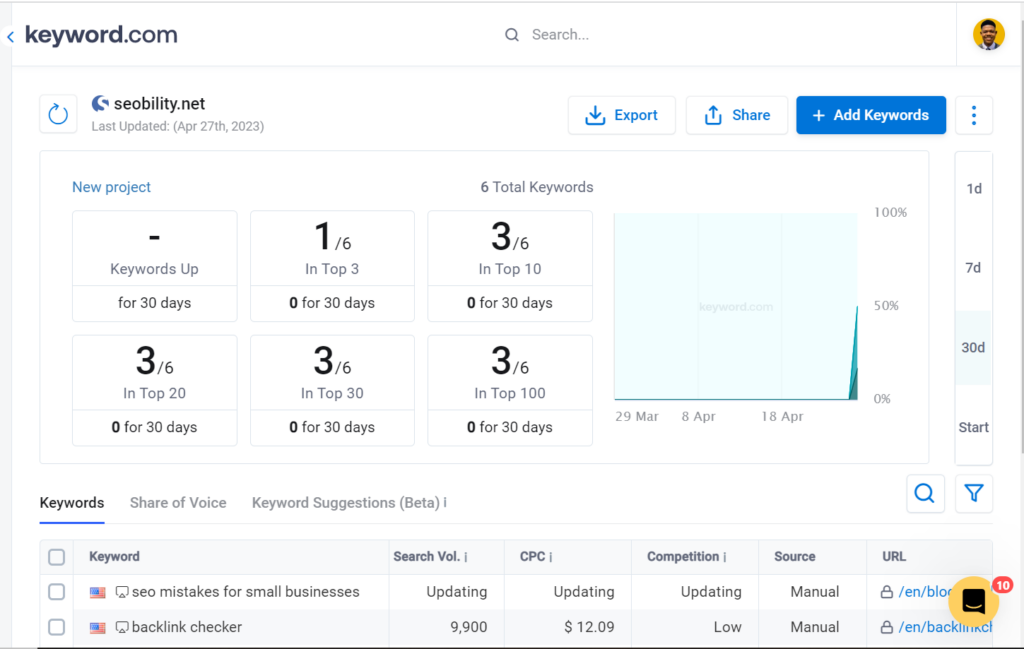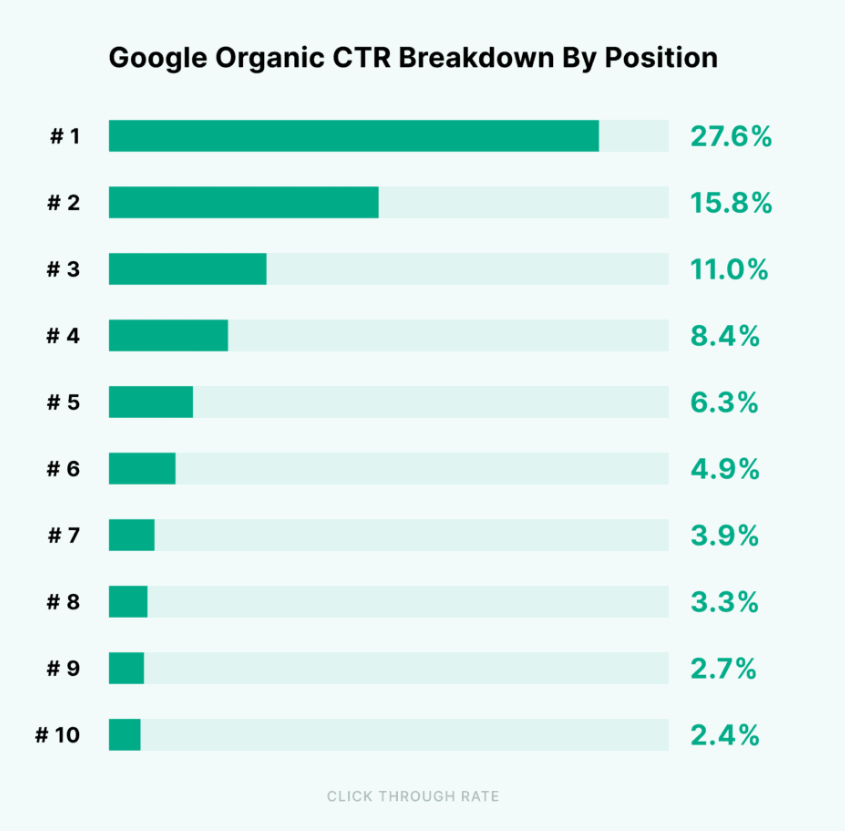A good rank-tracking report is, first and foremost, thorough.
And by thorough, we do not mean exhausting. It’s not cluttered with every result under the sun.
So, in this article, we will cover in-depth detail of rank-tracking reports, their benefits, and what to include. We will also discuss vital rank metrics necessary for measuring your SEO performance.
What Is Rank Tracking?
Rank tracking involves monitoring a website’s performance in search engine results pages (SERPs) for specific keywords or phrases. It helps website owners and SEO professionals understand how well their web pages rank in search engine results and allows them to assess the effectiveness of their SEO strategies.
To begin rank tracking, keywords are selected, typically based on their relevance to the website’s content, products, or services. These keywords represent the search terms that users might use to find the site.
Rank tracking tools then monitor the website’s rankings for these chosen keywords in various search engines, with Google being the most commonly tracked. The tools record the position of each webpage (e.g., homepage, product pages) in the SERPs for these keywords. This information provides valuable insights into the site’s visibility and search engine performance.
What Are Rank Tracking Reports?
Rank tracking reports provide information about the positions of specific web pages or websites in search engine results pages (SERPs) for targeted keywords. These reports are commonly used in search engine optimization (SEO) to monitor and evaluate search visibility over time.
In other words, rank-tracking reports help you know your share of voice on your keywords. It details how you perform on SERPs for your keywords compared to your competitors.
In simple terms, rank-tracking reports are gauges that vet the success of your SEO campaign.
The Benefits of Rank Tracking Reports
1. Track the Performance of your SEO Campaigns
The primary benefit of rank-tracking reports is to analyze the effect of your SEO strategies on your site. Rank-tracking reports provide details of your positions on SERPs for your keywords.
2. They Serve As Proof of Progress
As an SEO consultant, it can be daunting to explain your SEO strategies’ progress to your client by mouth. That’s where rank tracking reports come in!
They highlight impressive results of your SEO strategies; what you are doing that is helpful, and Google reacts within a time range. Also, the report can be shared with other employees to see the success of the site and areas for adjustment. For example, Keyword.com’s rank-tracking reports can be downloaded as CSV or PDF and shared with clients or co-employees.
3. Ability to Analyze Your Competitors
Your competitors are an archive of information where you can get new strategies and figure out new techniques to outrank them. Rank-tracking reports help you analyze and track your competitors’ keywords, tell you when they do something unique that you are not doing, and give you ideas on how to outperform them.
4. Discover Areas for Improvement
Analyzing relevant issues on your site helps you figure out areas to improve your site’s search performance. You know what is/not working and optimize appropriate techniques for better results.
5. Identify Future Opportunities
By tracking your keywords, you can identify specific keywords driving the most traffic and create future content around those keywords. That’s a content marketing strategy vetted by accurate data, not wild guesses. For example, a keyword converting five times your site’s average traffic is a golden keyword that can skyrocket your site’s visibility.
Now that you know the importance of a rank-tracking report, let’s examine a few rank metrics.
Related:
A guide to interpreting keyword metrics for a successful campaign
Best practices for ongoing keyword monitoring
Why SEOs Should Use Share of Voice as a KPI
5 Crucial Rank Metrics
1. Keyword Rankings
The primary goal of every SEO expert is to rank on the first page of SERPs for their target keywords. Keyword ranking is, therefore, the position of a site on search engine result pages for specific keywords. Optimization to improve your site’s ranking for its keywords is something you need to monitor. More so, ranking on the first page is like slippery ground.
Why?
The competition is fierce!
Again, search engines update their algorithms time and again.
You must track your rankings to discover changes and unforeseen fluctuations.
2. Organic Traffic Insights
Organic traffic is the number of visitors that visit your site through unpaid sources (organic clicks). This means the traffic coming into your site without paying for display ads or PPC.
Organic traffic insights help you discover pages that resonate more with your audience to create more converting content in the future. Also, this data helps marketers correlate rankings with traffic and identify why pages are gaining or losing traffic.
3. Organic Click-Through Rates
Do you want to know the number of people that found your site on SERPs and clicked to read its content?
Analyze your organic click-through rates! Your site’s organic click-through rate is the percentage of people that clicked on your URL on search engine result pages.
A high click-through rate shows that you have convinced search engine users enough that your page is the solution center to the query. But you need to know that there is a strong correlation between a page’s ranking and its click-through rate.
In 2022, Backlinko and his team studied four million Google search results to understand the organic click-through rate better.
Here is the breakdown of the click-through rates from Google’s first-page result study:
The higher your CTR, the better your ranking.
Don’t forget that Google’s primary goal is to provide users with the most relevant and highest-quality results based on their search queries. So, if your site gets more clicks, it signals to Google’s algorithm that your page is super relevant for its keywords. That results in a boost in ranking.
4. Backlinks Analysis
In 2016, Andrey Lipattsev, Search Quality Senior Strategist at Google, confirmed backlinks as one of the most vital ranking factors. That’s why most brands focus on creating link-bait content, i.e. pages other sites can link to, and follow different link-building strategies.
Banklink analysis provides the quality and quantity of your site’s backlinks and discovers new link-building opportunities.
5. Search Visibility
Search visibility refers to how well your site is visible on SERPs. In other words, it measures your ranking on search engine result pages for specific keywords.
High search visibility = more clicks = more traffic.
Search visibility provides a clearer picture of your dominance on SERPs that keyword rankings analysis can’t do. Read our complete guide on how to increase your site’s search visibility.
What to Include in a Rank-Tracking Report?
Your rank-tracking report should focus on the website’s goals and objectives, i.e. your business KPIs. That doesn’t mean you should limit what you report on as that can also translate to missed data. Essentially, it just boils down to ensuring your reports are clear, actionable, and relevant.
Let’s start by examining a few business goals and key metrics to be included in your report:
Lead Generation
– Organic traffic insights
– Click-through rate
Increase in Sales
– Organic traffic insights
– Click-through rate
– Conversion rate
– Competitors’ ranking
Increase in Site Visibility
– Keyword rankings
– Backlink monitoring
– Competitors Ranking
While your business KPI may extend beyond the list above, here are some metrics you will want to include in your report to track the performance of your SEO campaign:
- Keyword Performance Overview: rank-tracking is more about your keywords’ overall progress and impact on your site. You should provide an overview of keyword rankings – highlighting improvements, weak keywords, declines, and noteworthy changes. This gives a clear picture of your clients’ websites’ progress.
- Visibility Trends: show how your website’s visibility on SERPs has changed over time. Visualize the data using graphs or charts to make it easier for clients to understand.
- Competitor Analysis: include a comparison of your website’s performance against competitors. Highlight areas where you are outperforming them and identify opportunities for improvement.
- Traffic and Conversion Insights: showcase the impact of rank changes on organic traffic and conversions. Share success stories of pages that have seen significant improvements and explain the strategies behind those wins.
You can include other metrics like the number of backlinks, referring domains, follow and no-follow links, and more.
The Effect of Location on Rank-Tracking Reports
In a statement released by Google, location affects search engine result pages.
“To give you the most useful information, search algorithms look at many factors and signals, including the words of your query, relevance and usability of pages, the expertise of sources, and your location and settings.”
We advise you to set up multiple reports to track your keywords by location to get the most accurate overall website visibility.
Creating Your Rank-tracking Report with Keyword.com
We have discussed rank-tracking reports throughout the article. Now let’s examine a vital rank-tracking reporting tool for creating an all-in-one report.
Keyword.com provides four distinct features that make SEO reporting easy:
– One-click shareable reports
– Scheduled reports
– White label reports
– Custom domain
Keyword.com’s third-party verification tool ensures users get the most accurate ranking report on search engine result pages.
In addition, your clients can access live reports by sharing the report link with them. Also, scheduled email reports can be downloaded as CSV or PDF and shared with clients. Interestingly, the email can be automatically scheduled (daily, weekly, or at any frequency) to multiple recipients to ease the stress of sharing them.
Most importantly, this keyword reporting tool takes off the stress of trying to create a report for different locations. This keyword ranking reporting tool allows you to narrow your rank monitoring to various zip codes or cities and generate ranking reports for them.
Is it about creating white-label reports featuring your company’s logo, URL, and information? Or its rank-tracking API that pulls unlimited data?
Keyword.com reporting tool has got you covered!

